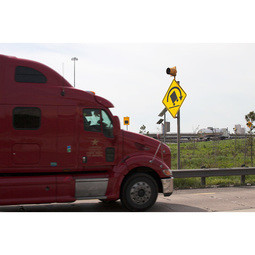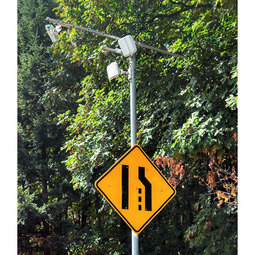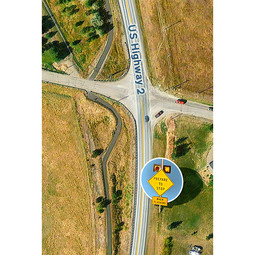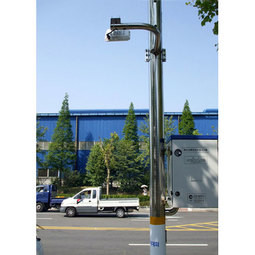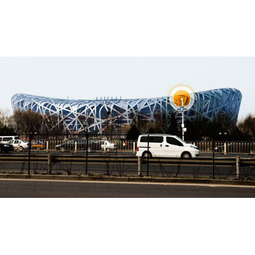Case Studies.
Our Case Study database tracks 18,927 case studies in the global enterprise technology ecosystem.
Filters allow you to explore case studies quickly and efficiently.
-
(4)
- (4)
-
(1)
- (1)
- (5)
- (5)
- (4)
- (1)
- (5)
Selected Filters
5 case studies
|
Truck Rollover Prevention System
Wavetronix
TxDOT has deployed a system to alert truck drivers when they exceed the safe, posted speed limit on freeway ramps. The goal is to reduce the number of semi-truck rollovers that occur when truck drivers attempt to negotiate the ramps at unsafe speeds.Magdy Kozman, transportation operations engineer at TxDOT, says there was considerable trouble on tight interchange connector ramps around Houston. “There were high instances of trucks rolling over due to excessive speed, unknown cargo loading factors, and freeway super elevation problems,” Kozman says. TxDOT needed a non-intrusive solution because their previous loop system required a traffic control plan to close the ramp for installation. It also needed to get creative with methods of alerting drivers. “The flashing system was a challenge because no other similar application existed to our knowledge,” Kozman says.
|
|
Advance Tunnel Warning System
Wavetronix
The Oregon Department of Transportation has implemented an advance warning system that alerts drivers entering a tunnel to the presence of slow or stopped traffic at the tunnel’s exit. The system uses a combination of SmartSensor Advance and Matrix units to detect traffic; if certain conditions exist, the system activates a flashing sign that warns drivers to slow down.Transportation officials in Oregon were faced with a dangerous traffic situation at the interchange between Interstate 84 and Interstate 205 east of Portland: a significant number of rear-end collisions were occurring because drivers were unaware that traffic ahead of them had slowed or stopped. The problem occurred at a tunnel that drivers must enter to merge from westbound I-84 onto southbound I-205. There is a sharp left turn just after the tunnel and traffic often backs up to the tunnel exit, particularly during peak congestion times. Drivers entering the tunnel at full speed were unaware of conditions ahead of them, and could not see stopped traffic around the turn.
|
|
Intersection Advance Warning System
Wavetronix
US Highway 2 at Kalispell, Montana, features a dangerous, non-signalized intersection that has been the site of numerous crashes. The two-lane, high-speed highway intersects with Springcreek Road/Dern Road and has no turn lane. The goal of the project was to improve safety at the intersection without adding lanes or installing signals. Because there is no turn lane, when eastbound cars need to turn left onto Springcreek Road they are forced to stop in the lane of travel and hope that cars approaching from behind see them and stop in time. Unfortunately, too many drivers didn’t see the stopped vehicles until it was too late, resulting in numerous crashes. The posted speed limit on that stretch of US Highway 2 is 65 mph, and the road is heavily traveled by large semis. Finally, funding issues made a build-out of the intersection unfeasible.
|
|
Green Technology Deployment
Wavetronix
Incheon City’s transportation agency needed a traffic management system that could keep traffic moving by identifying areas of congestion and offering alternative routes to drivers. The goal of the system was to reduce the societal costs associated with traffic congestion as well as the pollution caused by vehicle emissions. “Incheon City officials are committed to reducing pollution,” says David Lee, who represents Wavetronix in South Korea. “The catchphrase here is ‘low carbon monoxide and green traffic systems.’”Incheon City has a population of more than 2.6 million and is home to South Korea’s largest airport and largest western seaport. These factors result in a large and unpredictable stream of traffic on the city’s roadways, and the heavy congestion has led to inefficient roads and high levels of air pollution. Because traffic flow through the city can alternate in unpredictable patterns, traffic engineers need real-time traffic volumes, lane occupancy and per vehicle speeds in order to determine when and where alternative routes should be made available. This detection is required 24 hours a day, seven days a week and must run efficiently with little downtime in order to keep these unpredictable traffic flows moving smoothly. Because the city is often covered in fog, video detection is rendered unusable; inductive loops, while accurate in fog, require extensive and expensive installation and maintenance. This efficiency became especially important as Incheon City prepared to host the 2014 Asian Games, which were expected to cause even more traffic, especially at the airport and on the newly-completed, 13 mile (21 km) Incheon Grand Bridge, which offers another route between Yeonjong Island, where the airport is located, and the mainland.
|
|
Rapid Sensor Deployment
Wavetronix
The 2008 Beijing Summer Olympics highlighted an issue facing much of China: infrastructure construction is not keeping up with population demand. China is one of the fastest growing vehicle markets in the world with an estimated 20,000 new vehicles hitting the road each day. The problems at the Olympics were exasperated by an increase in tourist traffic and a need to quickly and easily install an intelligent transportation system powerful enough to handle Beijing’s tough traffic problems.The systems created for the Olympic Games needed to be highly accurate and reliable. Detection devices also had to accurately detect traffic over eight to 10 lanes. Inductive loops take too long to install and were unreliable and unable to adapt to changing traffic patterns.
|




